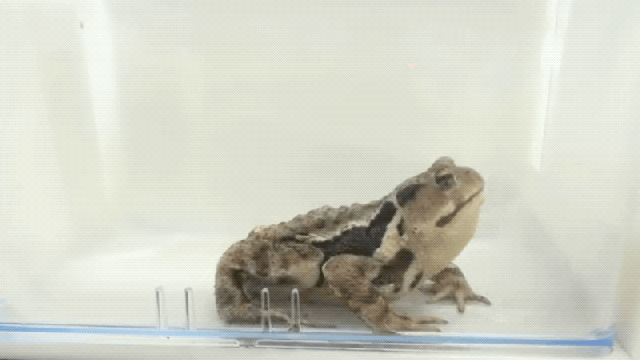It’s a cruel world out there, and animals will do just about anything to avoid being eaten. In the case of bombardier beetles, these crafty insects are able to escape after being swallowed by toads, which they do by ejecting hot, noxious chemicals that forces the predator to barf. It ain’t pretty, but it works.
Credit: Shinji Sugiura & Takuya Sato, Kobe University.
Small prey animals have evolved all sorts of physical defences, including thorns, hairs and highly unpleasant toxic substances. Back in May 2016, Kobe University researcher Takuya Sato and his colleagues were studying the defensive behaviours and chemical attacks utilised by a species of bombardier beetle known as Pheropsophus jessoensis, an insect common to Korea and Japan. In one experiment, the researchers fed a bombardier beetle to a toad under lab conditions to see what would happen.
“The toad readily swallowed the beetle,” wrote the researchers in a follow-up study, published yesterday in Biology Letters. “However, it vomited the beetle 44 minutes after swallowing it. The vomited beetle was still alive and active.”
The scientists had never seen a toad or frog do this before, prompting further investigation. The follow-up study was an effort to clarify the ecological factors involved, and determine how the beetles are able to survive for so long in the belly of their predators.
There are nearly 650 known species of bombardier beetles, all of which produce noxious chemicals in their guts. When threatened, they mix these chemicals together and eject a hot spray from the tips of their abdomens (that is, their behinds) with tremendous force. This typically happens during a predatory attack, dissuading the enemy from eating the bug. In some cases, these chemicals can reach an astounding 100C. In Pheropsophus jessoensis, the resulting chemical reactions produce hydrogen peroxide and a class of compounds known as benzoquinones – irritants that are known to damage tissue, such as skins and lungs.
In the new experiment, Sato fed the live bombardier beetles to two different toad species, Bufo japonicus and B. torrenticola, to see if the hot chemical brew might force the amphibians to regurgitate. To test various conditions, some beetles were depleted of their chemical defences prior to being eaten (which the scientists did by poking and prodding the bombardier beetles before they were exposed to the toads), and by testing beetles and toads of various sizes.
All beetles depleted of their chemical defences were killed and fully digested in the stomachs of the toads. So there’s that.
But those who retained their defences fared considerably better: 43 per cent of toads puked out the beetles anywhere from 12 to 107 minutes after they swallowed them. Incredibly, all vomited beetles were alive and well following the ordeal.
Importantly, large beetles did better than small beetles, escaping more frequently, while small toads vomited the beetles more often than large toads. “Our results demonstrate the importance of the prey-predator size relationship in the successful escape of prey from inside a predator,” wrote the researchers in the study.
This experiment also tells us something about bombardier beetle durability. The digestive system of toads contain digestive juices in the form of acidic chemicals. Incredibly, the upchucked beetles were able to withstand this tortuous environment for nearly two hours. The researchers say the beetles have evolved a hardy, defensive shell, which allows the beetles to remain intact and stay alive until their hot butt stuff forces the toad to vomit.
Isn’t nature lovely?
